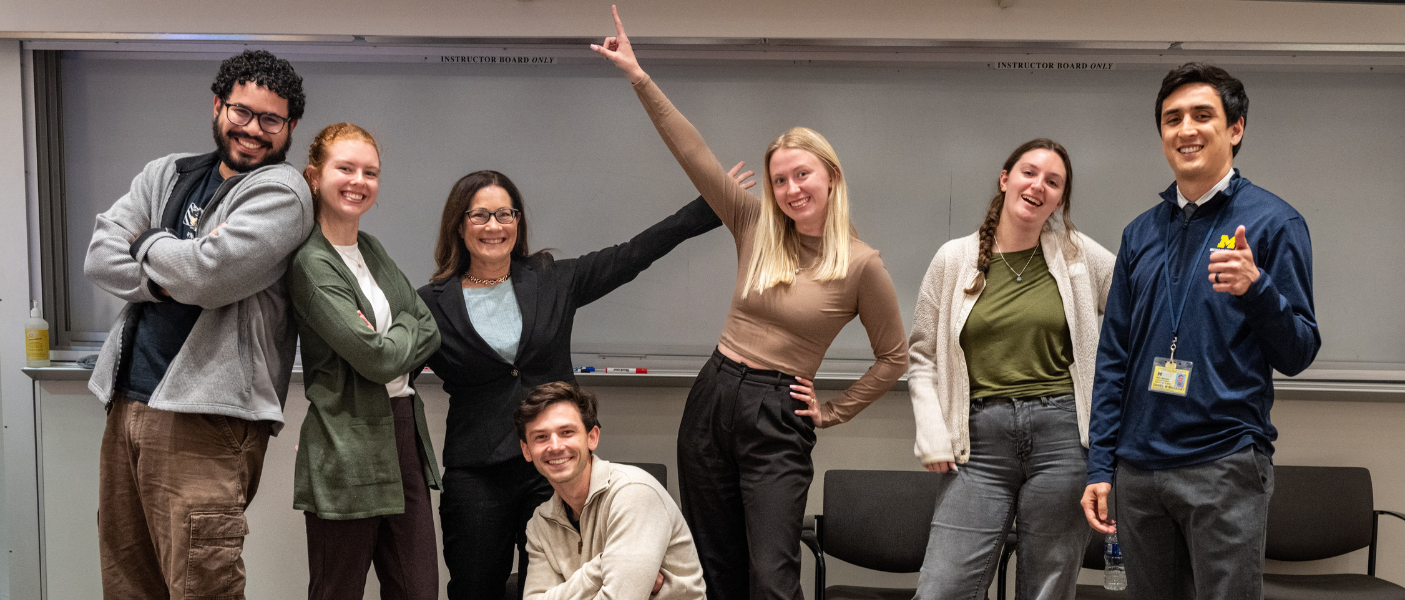

In today’s environment, some people wonder, are grant funds being used wisely? On May 22, 2025, the National Institutes of Health National Institute of General Medical Sciences’ funded Training Program in Translational Research (TPTR) program at the University of Michigan Medical School held their Ninth Annual Retreat where the audience heard from three of the funded graduate students on their research as well as from two guest speakers. The keynote speaker, Brian Blagg, PhD, is the Charles Huisking Professor of Chemistry and Biochemistry and the director of the Warren Center for Drug Research at the University of Notre Dame. Zhen Xu, PhD, the Li Ka Shing Professor of Biomedical Engineering and professor of radiology and neurosurgery at the University of Michigan, also shared her insights.
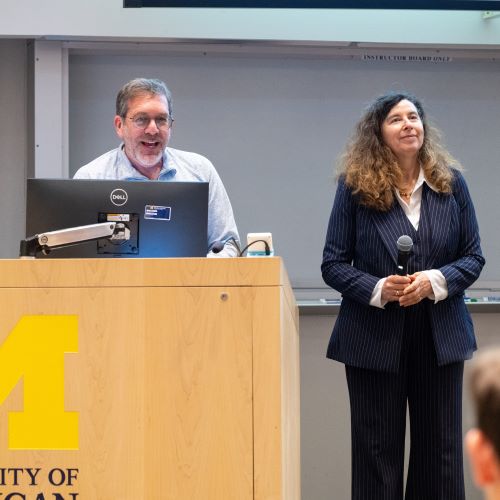 As TPTR co-directors, Andrew Lieberman, MD, PhD, the Gerald D. Abrams Collegiate Professor of Pathology, and Zaneta Nikolovska-Coleska, MS, PhD, professor of pathology and associate dean for graduate and postdoctoral studies stated, “These trainees are working to become the next generation of translational researchers, performing bench to bedside investigations in multidisciplinary, collaborative research settings.”
As TPTR co-directors, Andrew Lieberman, MD, PhD, the Gerald D. Abrams Collegiate Professor of Pathology, and Zaneta Nikolovska-Coleska, MS, PhD, professor of pathology and associate dean for graduate and postdoctoral studies stated, “These trainees are working to become the next generation of translational researchers, performing bench to bedside investigations in multidisciplinary, collaborative research settings.”
Our Students’ Research Presentations
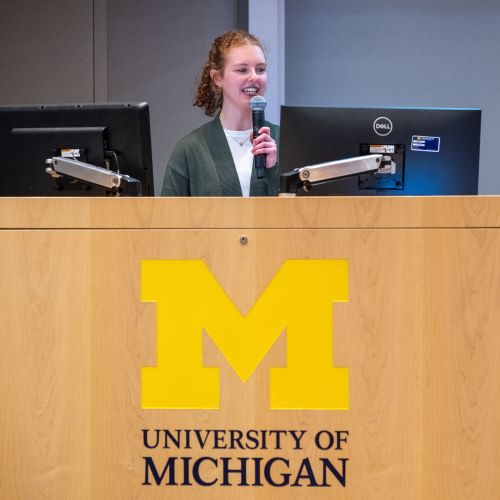 Molecular and Cellular Pathology candidate and TPTR trainee Sydney Musser was first on the day’s agenda, presenting her research on “Small molecule inhibition of Polycomb repressive complex 1 in B-cell lymphoblastic leukemia models.” The purpose of her research, conducted under the mentorship of Drs. Jolanta Grembecka and Tomasz Cierpicki, is to find novel therapeutic approaches for the treatment of B-cell Acute Lymphoblastic Leukemia (B-ALL), the most common type of ALL in adults, accounting for 75-80% of all cases of ALLL.
Molecular and Cellular Pathology candidate and TPTR trainee Sydney Musser was first on the day’s agenda, presenting her research on “Small molecule inhibition of Polycomb repressive complex 1 in B-cell lymphoblastic leukemia models.” The purpose of her research, conducted under the mentorship of Drs. Jolanta Grembecka and Tomasz Cierpicki, is to find novel therapeutic approaches for the treatment of B-cell Acute Lymphoblastic Leukemia (B-ALL), the most common type of ALL in adults, accounting for 75-80% of all cases of ALLL.
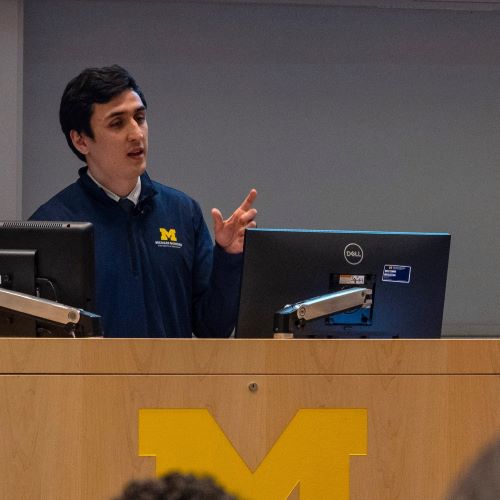 Daniel Magaoay, Molecular and Integrative Physiology candidate and TPTR trainee from the Dr. Daniel Lawrence lab, then delivered his research presentation, “Blocking interaction between tissue plasminogen activator and the N-methyl-D-aspartate receptor is neuroprotective in an alpha-synuclein overexpression model of Parkinson’s disease.” Nearly 90,000 people in the United States are diagnosed with Parkinson’s disease annually. Magaoay’s research is focused on generating insights into alternative strategies and targets for the development of new therapeutics for this disease.
Daniel Magaoay, Molecular and Integrative Physiology candidate and TPTR trainee from the Dr. Daniel Lawrence lab, then delivered his research presentation, “Blocking interaction between tissue plasminogen activator and the N-methyl-D-aspartate receptor is neuroprotective in an alpha-synuclein overexpression model of Parkinson’s disease.” Nearly 90,000 people in the United States are diagnosed with Parkinson’s disease annually. Magaoay’s research is focused on generating insights into alternative strategies and targets for the development of new therapeutics for this disease.
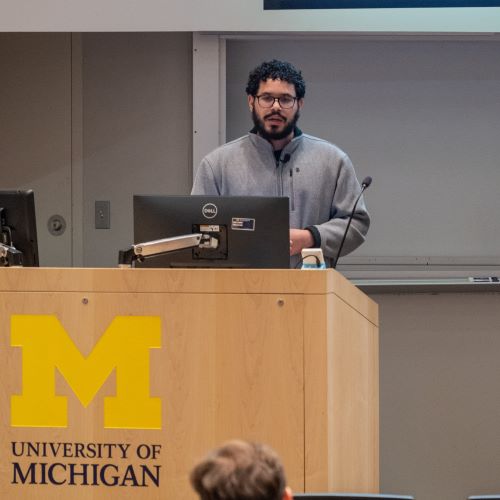 Martin Fernandez, Biophysics candidate and TPTR trainee, talked about his research, “Molecular visualization of neuronal TDP43 pathology.” TDP-43 accumulation in the cytoplasm and exclusion in the nucleus is defining for amyotrophic lateral sclerosis (ALS) and frontotemporal lobular degeneration (FTLD), yet TDP-43 is not well understood. Fernandez’ research conducted in the Dr. Shymal Mosalaganti lab, focused on developing a visual model of TDP-43, which may allow future researchers to develop ways to treat these debilitating disorders.
Martin Fernandez, Biophysics candidate and TPTR trainee, talked about his research, “Molecular visualization of neuronal TDP43 pathology.” TDP-43 accumulation in the cytoplasm and exclusion in the nucleus is defining for amyotrophic lateral sclerosis (ALS) and frontotemporal lobular degeneration (FTLD), yet TDP-43 is not well understood. Fernandez’ research conducted in the Dr. Shymal Mosalaganti lab, focused on developing a visual model of TDP-43, which may allow future researchers to develop ways to treat these debilitating disorders.
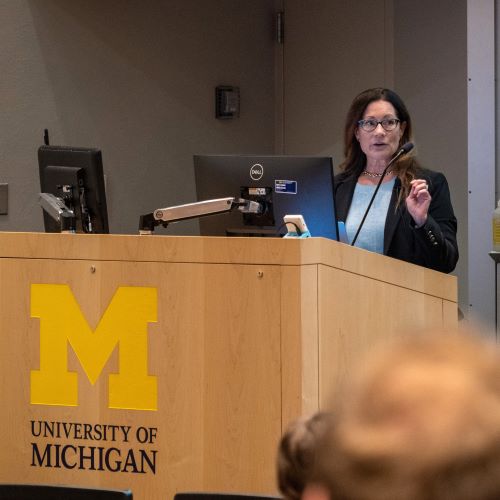 Holly Attebury, Cancer Biology candidate and MICHR trainee under mentors Drs. Donnele Daley and Marina Pasca di Magliano, was the final student to present her research, “Bacterial dysbiosis drives inflammation and cancer cell survival in pancreatic adenocarcinoma.” This research focused on the differences in the pancreatic gut microbiome between patients with and without pancreatic cancers and their metabolic pathways. She discussed the insights gained in her research that may provide therapeutic strategies for the treatment of pancreatic cancers.
Holly Attebury, Cancer Biology candidate and MICHR trainee under mentors Drs. Donnele Daley and Marina Pasca di Magliano, was the final student to present her research, “Bacterial dysbiosis drives inflammation and cancer cell survival in pancreatic adenocarcinoma.” This research focused on the differences in the pancreatic gut microbiome between patients with and without pancreatic cancers and their metabolic pathways. She discussed the insights gained in her research that may provide therapeutic strategies for the treatment of pancreatic cancers.
Our Guests
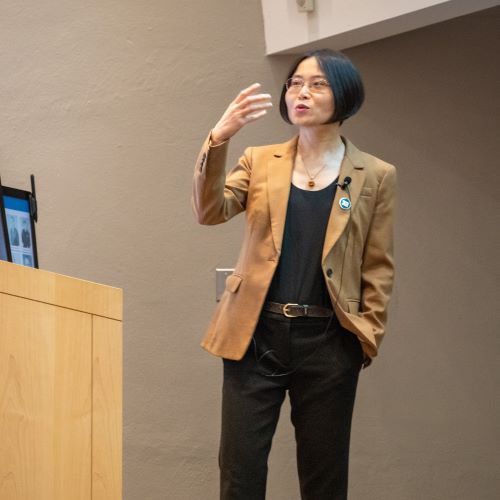 Zhen Xu, PhD provided attendees with a transparent talk about her experiences as a researcher and entrepreneur in her talk, “Non-Invasive Histotripsy Cancer Treatment: The road from bench to bedside.’ She described her research journey, then how she commercialized her research project and the barriers encountered along the way. This provided the students in attendance with an idea of what it takes to truly take research from bench to bedside.
Zhen Xu, PhD provided attendees with a transparent talk about her experiences as a researcher and entrepreneur in her talk, “Non-Invasive Histotripsy Cancer Treatment: The road from bench to bedside.’ She described her research journey, then how she commercialized her research project and the barriers encountered along the way. This provided the students in attendance with an idea of what it takes to truly take research from bench to bedside.
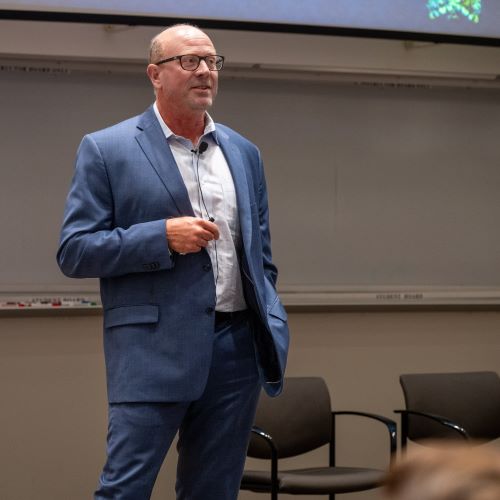 The retreat wrapped up with keynote speaker Brian S.J. Blagg, PhD, who presented his lecture on “Turning Lemons into Lemonade: Rediscovery of Hsp90 Inhibitors.” Dr. Blagg described the work of his laboratory, which designs, synthesizes, and evaluates novel inhibitors of the Hsp90 protein folding process. To achieve this, they use computer modeling to design new molecules that bind with ATP-binding sites. They develop new organic reactions that allow access to the desired compounds and assays to determine the biological effects of their designed Hsp90 inhibitors.
The retreat wrapped up with keynote speaker Brian S.J. Blagg, PhD, who presented his lecture on “Turning Lemons into Lemonade: Rediscovery of Hsp90 Inhibitors.” Dr. Blagg described the work of his laboratory, which designs, synthesizes, and evaluates novel inhibitors of the Hsp90 protein folding process. To achieve this, they use computer modeling to design new molecules that bind with ATP-binding sites. They develop new organic reactions that allow access to the desired compounds and assays to determine the biological effects of their designed Hsp90 inhibitors.
The panel discussion on "Translating Research Findings into Innovation and Clinical Practice," moderated by Dr. Zaneta Nikolovska Coleska, featured Dr. Brian S.J. Blagg, Dr. Zhen Xu, and Sarah Jameson-Valencia, the associate director of ventures - life sciences at the University of Michigan Innovation Partnerships. The discussion provided insights into identifying promising technologies, the barriers and enablers of translational research, and the importance of collaboration and team science.
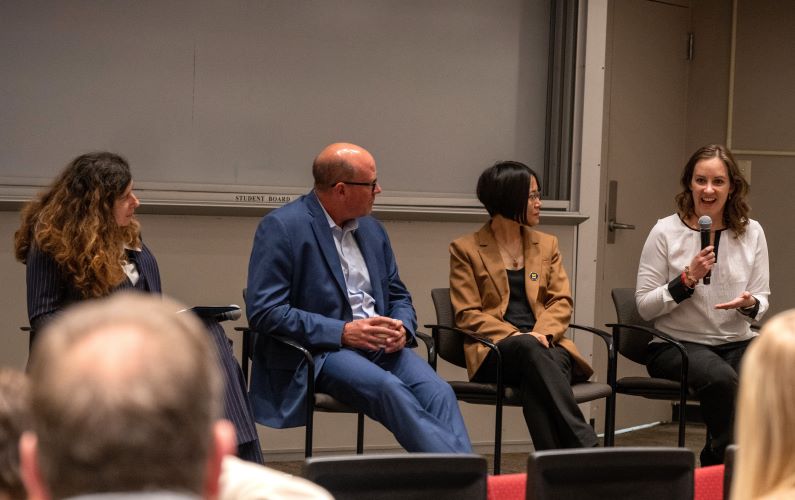 This fantastic retreat highlighted the amazing discoveries and progress being made by our students and our guests. The investment in research will pay long-term dividends for patients as these emerging researchers uncover mechanisms of disease leading to new treatment paradigms, which can then be translated from the research bench to the patient bedside.
This fantastic retreat highlighted the amazing discoveries and progress being made by our students and our guests. The investment in research will pay long-term dividends for patients as these emerging researchers uncover mechanisms of disease leading to new treatment paradigms, which can then be translated from the research bench to the patient bedside.
 ON THE COVER
ON THE COVER
Breast team reviewing a patient's slide. (From left to right) Ghassan Allo, Fellow; Laura Walters, Clinical Lecturer; Celina Kleer, Professor. See Article 2014Department Chair |

newsletter
INSIDE PATHOLOGYAbout Our NewsletterInside Pathology is an newsletter published by the Chairman's Office to bring news and updates from inside the department's research and to become familiar with those leading it. It is our hope that those who read it will enjoy hearing about those new and familiar, and perhaps help in furthering our research. CONTENTS
|
 ON THE COVER
ON THE COVER
Autopsy Technician draws blood while working in the Wayne County morgue. See Article 2016Department Chair |

newsletter
INSIDE PATHOLOGYAbout Our NewsletterInside Pathology is an newsletter published by the Chairman's Office to bring news and updates from inside the department's research and to become familiar with those leading it. It is our hope that those who read it will enjoy hearing about those new and familiar, and perhaps help in furthering our research. CONTENTS
|
 ON THE COVER
ON THE COVER
Dr. Sriram Venneti, MD, PhD and Postdoctoral Fellow, Chan Chung, PhD investigate pediatric brain cancer. See Article 2017Department Chair |

newsletter
INSIDE PATHOLOGYAbout Our NewsletterInside Pathology is an newsletter published by the Chairman's Office to bring news and updates from inside the department's research and to become familiar with those leading it. It is our hope that those who read it will enjoy hearing about those new and familiar, and perhaps help in furthering our research. CONTENTS
|
 ON THE COVER
ON THE COVER
Director of the Neuropathology Fellowship, Dr. Sandra Camelo-Piragua serves on the Patient and Family Advisory Council. 2018Department Chair |

newsletter
INSIDE PATHOLOGYAbout Our NewsletterInside Pathology is an newsletter published by the Chairman's Office to bring news and updates from inside the department's research and to become familiar with those leading it. It is our hope that those who read it will enjoy hearing about those new and familiar, and perhaps help in furthering our research. CONTENTS
|
 ON THE COVER
ON THE COVER
Residents Ashley Bradt (left) and William Perry work at a multi-headed scope in our new facility. 2019Department Chair |

newsletter
INSIDE PATHOLOGYAbout Our NewsletterInside Pathology is an newsletter published by the Chairman's Office to bring news and updates from inside the department's research and to become familiar with those leading it. It is our hope that those who read it will enjoy hearing about those new and familiar, and perhaps help in furthering our research. CONTENTS
|
 ON THE COVER
ON THE COVER
Dr. Kristine Konopka (right) instructing residents while using a multi-headed microscope. 2020Department Chair |

newsletter
INSIDE PATHOLOGYAbout Our NewsletterInside Pathology is an newsletter published by the Chairman's Office to bring news and updates from inside the department's research and to become familiar with those leading it. It is our hope that those who read it will enjoy hearing about those new and familiar, and perhaps help in furthering our research. CONTENTS
|
 ON THE COVER
ON THE COVER
Patient specimens poised for COVID-19 PCR testing. 2021Department Chair |

newsletter
INSIDE PATHOLOGYAbout Our NewsletterInside Pathology is an newsletter published by the Chairman's Office to bring news and updates from inside the department's research and to become familiar with those leading it. It is our hope that those who read it will enjoy hearing about those new and familiar, and perhaps help in furthering our research. CONTENTS
|
 ON THE COVER
ON THE COVER
Dr. Pantanowitz demonstrates using machine learning in analyzing slides. 2022Department Chair |

newsletter
INSIDE PATHOLOGYAbout Our NewsletterInside Pathology is an newsletter published by the Chairman's Office to bring news and updates from inside the department's research and to become familiar with those leading it. It is our hope that those who read it will enjoy hearing about those new and familiar, and perhaps help in furthering our research. CONTENTS
|
 ON THE COVER
ON THE COVER
(Left to Right) Drs. Angela Wu, Laura Lamps, and Maria Westerhoff. 2023Department Chair |

newsletter
INSIDE PATHOLOGYAbout Our NewsletterInside Pathology is an newsletter published by the Chairman's Office to bring news and updates from inside the department's research and to become familiar with those leading it. It is our hope that those who read it will enjoy hearing about those new and familiar, and perhaps help in furthering our research. CONTENTS
|
 ON THE COVER
ON THE COVER
Illustration representing the various machines and processing used within our labs. 2024Department Chair |

newsletter
INSIDE PATHOLOGYAbout Our NewsletterInside Pathology is an newsletter published by the Chairman's Office to bring news and updates from inside the department's research and to become familiar with those leading it. It is our hope that those who read it will enjoy hearing about those new and familiar, and perhaps help in furthering our research. CONTENTS
|
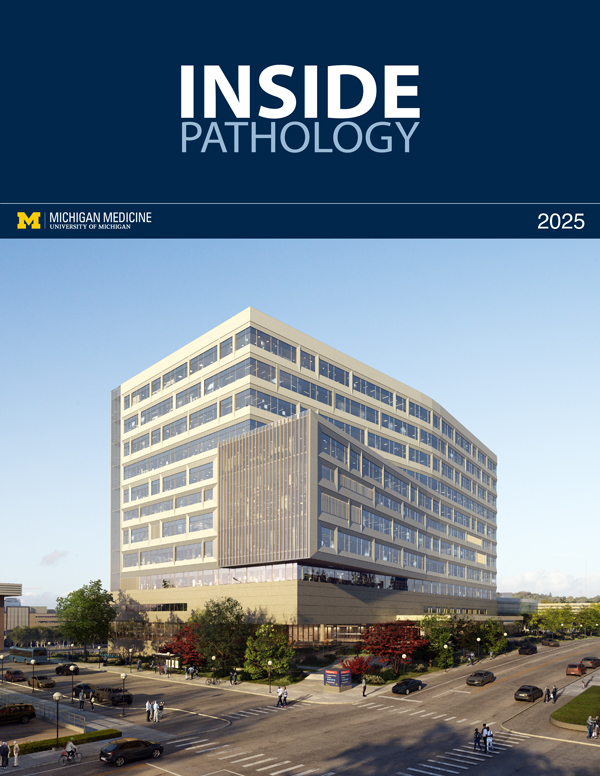 ON THE COVER
ON THE COVER
Rendering of the D. Dan and Betty Khn Health Care Pavilion. Credit: HOK 2025Department Chair |

newsletter
INSIDE PATHOLOGYAbout Our NewsletterInside Pathology is an newsletter published by the Chairman's Office to bring news and updates from inside the department's research and to become familiar with those leading it. It is our hope that those who read it will enjoy hearing about those new and familiar, and perhaps help in furthering our research. CONTENTS
|

MLabs, established in 1985, functions as a portal to provide pathologists, hospitals. and other reference laboratories access to the faculty, staff and laboratories of the University of Michigan Health System’s Department of Pathology. MLabs is a recognized leader for advanced molecular diagnostic testing, helpful consultants and exceptional customer service.